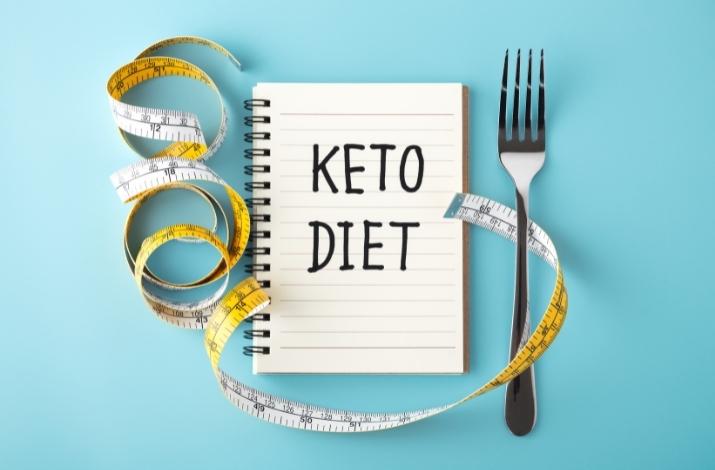What to Expect When Starting Keto

Over the past decade, the Ketogenic diet has skyrocketed in popularity – in 2020, “keto” was the most Googled food-related topic with over 25.4 million searches! In addition, keto-style food products are estimated to reach a global value of more than $15 billion by the year 2027. Why? Quite simply, people are seeing amazing health results by following a high-fat, ketogenic style diet.
With more and more people turning to keto for weight management, chronic disease management and therapeutic reasons, we wanted to set you up for success as you begin. Here’s what you can expect within the first couple of days, weeks, and months after starting keto.
1. Weight Loss: As you limit carbs, your body burns through its stored glycogen in the muscles and liver. Once glycogen is spent, your body switches to ketosis, a metabolic state in which ketones are produced from body fat and dietary fat. During this transition period, you can expect to see the scale drop rather quickly due to water weight loss and fat burn.
2. Decreased Joint Pain: The ketogenic diet is thought to be anti-inflammatory and thus helps with the aches and pains of inflammatory conditions [15, 16].
3. Thirst and Increased Urination: Your body releases water that is bound to glycogen as you use the last of your glycogen stores. This is partially the reason for the water weight loss, but also can contribute to thirst and increased urination in the beginning. It’s extremely important to hydrate well with water and electrolytes when starting a low-carb or ketogenic diet [5,6].
4. Cloudy Thinking: Feeling mental fatigue or fogginess is relatively normal a few days after starting keto, but it can be completely avoided. It happens because your brain switches from running on glucose to running on ketones. To alleviate the mental cloudiness try these things:
Lower Carbs Slowly: Start by eliminating sweets, soda, cakes, etc. Then move down the limiting pasta, bread, and most grains. Lastly, lower starchy veggies and fruits.
Increase Protein & Fat: Focus on eating enough protein and fat, especially when beginning keto.
5. Temporary Decreased Strength and Endurance: At the beginning of keto, it may feel challenging to work out with the same stamina and strength. There is anecdotal evidence of this happening during the first couple of weeks. It is important to understand that this is usually temporary, and after the period of fat-adaptation, keto is unlikely to prevent any muscle or strength increases [7,8,9].
6. Rapid Improvement in Blood Glucose Levels: Fasting blood glucose and post-meal blood sugars rapidly decrease on keto. You can expect reductions in the first few days/weeks of keto. You’ll see further reductions in HbA1c given a few months as well. Your blood sugar reduces so quickly, that it’s important to work with a medical professional when going keto if you’re on certain diabetes medications like insulin, sulfonylureas, and SGLT-2 inhibitors (canagliflozin, etc), etc [10].
7. Decreased Blood Pressure: Much like blood glucose levels, blood pressure also decreases when on a ketogenic diet. Some people’s blood pressure will go down within days, while it may take others several weeks or months to normalize. If you’re taking blood pressure medication you may experience low blood pressure so work with your healthcare provider to come up with a plan.
8. Decreased Appetite: One of the biggest weight loss benefits of keto is a controlled appetite. Several studies have found that participants that were allowed to consume however much food they’d like, eat less food if carbohydrates are restricted [11,12]. Ketosis helps suppress the hunger hormone ghrelin, it also helps increase serum leptin levels (the hormone that makes us full) [13,14].
9. Constipation or Diarrhea: Due to the changes in fiber and potential changes in the gut microbiome, you may experience some GI issues. This is easily remedied with enough water, electrolytes, and non-starchy vegetables.
The ketogenic diet can be life-changing for many, and while starting it may feel overwhelming at first, it’s well worth it. Most of the negative symptoms of the ketogenic diet can be avoided by following the tips above. Remember, if you’re taking prescription medications for diabetes or high blood pressure, it’s wise to consult your MD before changing your diet.
References
- Why good nutrition is important. Center for Science in the Public Interest. (2018, May 17). Retrieved June 27, 2022, from https://www.cspinet.org/eating-healthy/why-good-nutrition-important#:~:text=Unhealthy%20eating%20and%20physical%20inactivity,cancer%2C%20and%20type%202%20diabetes.
- Martin-McGill KJ, Lambert B, Whiteley VJ, Wood S, Neal EG, Simpson ZR, Schoeler NE., Ketogenic Dietitians Research Network (KDRN). Understanding the core principles of a ‘modified ketogenic diet’: a UK and Ireland perspective. J Hum Nutr Diet. 2019 Jun;32(3):385-390.
- LaFountain RA, Miller VJ, Barnhart EC, Hyde PN, Crabtree CD, McSwiney FT, Beeler MK, Buga A, Sapper TN, Short JA, Bowling ML, Kraemer WJ, Simonetti OP, Maresh CM, Volek JS. Extended Ketogenic Diet and Physical Training Intervention in Military Personnel. Mil Med. 2019 Oct 01;184(9-10):e538-e547.
- Westman EC, Tondt J, Maguire E, Yancy WS Jr. Implementing a low-carbohydrate, ketogenic diet to manage type 2 diabetes mellitus. Expert Rev Endocrinol Metab. 2018 Sep;13(5):263-272. doi: 10.1080/17446651.2018.1523713. PMID: 30289048.
- Fernández-Elías VE, Ortega JF, Nelson RK, Mora-Rodriguez R. Relationship between muscle water and glycogen recovery after prolonged exercise in the heat in humans. Eur J Appl Physiol. 2015 Sep;115(9):1919-26. doi: 10.1007/s00421-015-3175-z. Epub 2015 Apr 25. PMID: 25911631.
- Anton, S. D., Moehl, K., Donahoo, W. T., Marosi, K., Lee, S. A., Mainous, A. G., 3rd, Leeuwenburgh, C., & Mattson, M. P. (2018). Flipping the Metabolic Switch: Understanding and Applying the Health Benefits of Fasting. Obesity (Silver Spring, Md.), 26(2), 254–268. https://doi.org/10.1002/oby.22065
- Paoli A, Grimaldi K, D’Agostino D, Cenci L, Moro T, Bianco A, Palma A. (2012). Ketogenic diet does not affect strength performance in elite artistic gymnasts. J Int Soc Sprt Nutr. 26, (9).
- Wilson JM, Lowery RP, Roberts MD, Sharp MH, Joy JM, Shields KA, Partl J, Volek JS, D’Agostino D. (2017). The Effects of Ketogenic Dieting on Body Composition, Strength, Power, and Hormonal Profiles in Resistance Training Males. Journal of Strength and Conditioning Research.
- Sean A McCleary, Matthew H Sharp, Ryan P Lowery, Jeremy E Silva, Jacob T Rauch, Jacob A Ormes, Kevin A Shields, John I Georges and Jacob M Wilson. (2014). Effects of a ketogenic diet on strength and power. Journal of the International Society of Sports Nutrition. 11
- McKenzie AL, Hallberg SJ, Creighton BC, Volk BM, Link TM, Abner MK, Glon RM, McCarter JP, Volek JS, Phinney SD. A Novel Intervention Including Individualized Nutritional Recommendations Reduces Hemoglobin A1c Level, Medication Use, and Weight in Type 2 Diabetes. JMIR Diabetes 2017;2(1):e5. DOI: 10.2196/diabetes.6981
- Johnstone, A. M., Horgan, G. W., Murison, S. D., Bremner, D. M., & Lobley, G. E. (2008). Effects of a high-protein ketogenic diet on hunger, appetite, and weight loss in obese men feeding ad libitum. The American journal of clinical nutrition, 87(1), 44-55.
- Boden, G., Sargrad, K., Homko, C., Mozzoli, M., & Stein, T. P. (2005). Effect of a low-carbohydrate diet on appetite, blood glucose levels, and insulin resistance in obese patients with type 2 diabetes. Annals of internal medicine, 142(6), 403-411.
- Sumithran, P., Prendergast, L. A., Delbridge, E., Purcell, K., Shulkes, A., Kriketos, A., & Proietto, J. (2013). Ketosis and appetite-mediating nutrients and hormones after weight loss. European journal of clinical nutrition, 67(7), 759-764.
- Thio L. L. (2012). Hypothalamic hormones and metabolism. Epilepsy research, 100(3), 245–251. https://doi.org/10.1016/j.eplepsyres.2011.07.009
- Pinto, A., Bonucci, A., Maggi, E., Corsi, M., & Businaro, R. (2018). Anti-Oxidant and Anti-Inflammatory Activity of Ketogenic Diet: New Perspectives for Neuroprotection in Alzheimer’s Disease. Antioxidants (Basel, Switzerland), 7(5), 63. https://doi.org/10.3390/antiox7050063
- Shen, Y., Kapfhamer, D., Minnella, A.M. et al. Bioenergetic state regulates innate inflammatory responses through the transcriptional co-repressor CtBP. Nat Commun 8, 624 (2017). https://doi.org/10.1038/s41467-017-00707-0
This article is for informational and educational purposes only. It is not, nor is it intended to be substitute for professional medical advice, diagnosis, or treatment and should never be relied upon for specific medical advice.


















